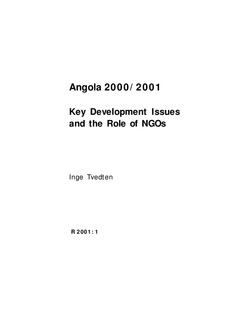| dc.contributor.author | Tvedten, Inge | |
| dc.date.accessioned | 2008-02-26T12:59:12Z | |
| dc.date.accessioned | 2017-03-29T09:12:23Z | |
| dc.date.available | 2008-02-26T12:59:12Z | |
| dc.date.available | 2017-03-29T09:12:23Z | |
| dc.date.issued | 2001 | |
| dc.identifier.isbn | 82-90584-90-3 | |
| dc.identifier.issn | 0805-505X | |
| dc.identifier.uri | http://hdl.handle.net/11250/2435823 | |
| dc.description.abstract | This is the second report on Angola under the Country Advisor Agreement between the Norwegian Agency for Development Cooperation (NORAD) and Chr. Michelsen Institute (CMI) and Nordic Consulting Group (NCG). The report consists of a Part I synthesising and assessing existing information regarding economic, political and social developments in Angola, and a Part II focusing on the role of national and international NGOs in the country. The number of NGOs has increased substantially since the introduction of the new democratic constitution in 1991. While they play an increasingly important role in emergency and development aid, they also occupy political space that is contested. | |
| dc.language.iso | eng | |
| dc.publisher | Chr. Michelsen Institute | |
| dc.relation.ispartofseries | Research report | |
| dc.relation.ispartofseries | R 2001: 1 | |
| dc.subject | Political economy | |
| dc.subject | Non-governmental organisations | |
| dc.subject | Angola | |
| dc.title | Angola 2000/2001. Key Development Issues and the Role of NGOs | |
| dc.type | Research report | |
